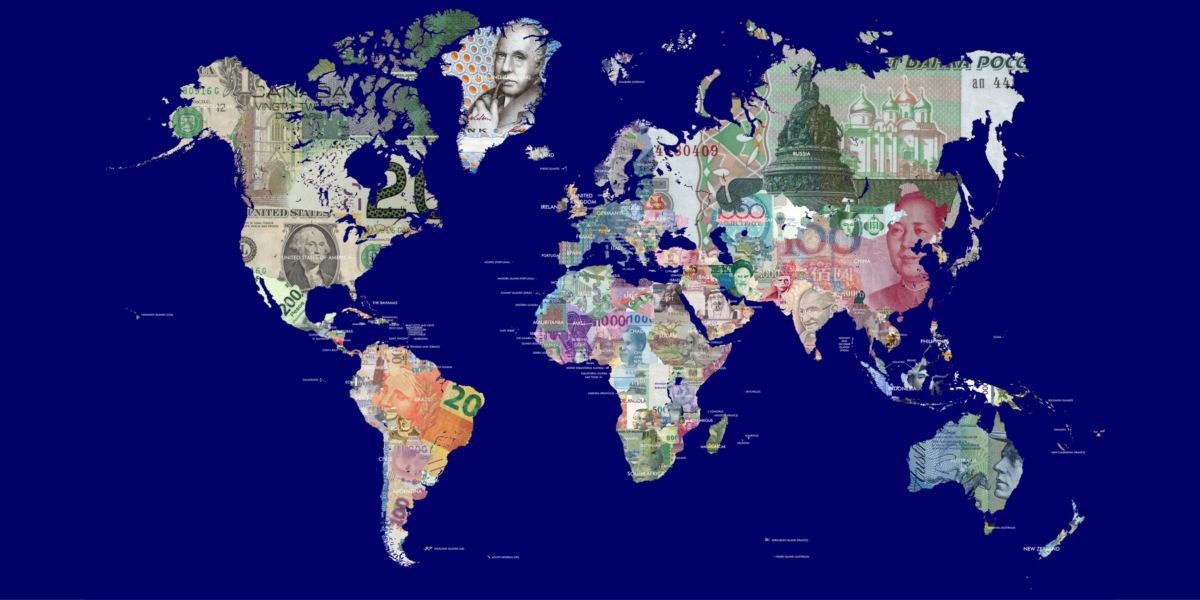
Autumn 2022

Global finance in the new geopolitical environment
The new paradigm in global politics will have a marked effect on financial transactions, writes Herbert Poenisch, senior research fellow, AIF Hangzhou, former senior economist, BIS.
Until the beginning of the pandemic, goods, services and finance were moving mostly unimpeded round the world. Globalisation was ticking round like a Swiss clock. President Xi Jinping of China presented his country as the champion of globalisation at Davos in early 2017. However, signs were appearing on the horizon that not all was well.
In geopolitics, the signs were sent by Russia, China and the US. In 2007 President Vladimir Putin spoke out against the leadership of the US and proposed a multipolar system. Xi did not express it in such a clear way but it became increasingly clear after 2017 that China was aiming to become the world leader, casting aside the paradigm of Deng Xiaoping, ‘hiding your strength and biding your time.’
The ‘Make America great again’ strategy of President Donald Trump was a clear signal to the world that the US was moving away from unfettered globalisation. The beginning of the war in Ukraine brought sanctions from the US and its allies which severely affected global trade and capital movements. In addition, Covid-19 necessitated lockdowns in China which severely affected supply chains that had already been strained during the pandemic.
The dominance of the US world order since the second world war has brought peace and stability to the world. Isolated wars flared up, but the basic order and institutions were grudgingly accepted, most importantly by the permanent members of the United Nations Security Council. However, this changed with Russia becoming more aggressive during Putin’s second presidency. Equally, China under Xi became increasingly assertive, particularly during his second period in office from 2017. This not only affected the global political order but also economics and finance.
China’s steps towards establishing its own economic and financial order were boosted by its Belt and Road Initiative. By early 2022, some 164 countries had joined this plan amounting to close to $1tn. Under the BRI, China not only provided funds for infrastructure investment, bypassing the World Bank, but also liquidity support, bypassing the International Monetary Fund. The funds were provided by Chinese policy banks and major commercial banks, each of which has more financial assets than the World Bank or IMF. China played its economic clout to underpin its global ambitions.
The ‘Make America great again’ strategy of President Donald Trump was a clear signal to the world that the US was moving away from unfettered globalisation.
Russia’s global ambitions are far more modest and provide mainly military support for some countries. However, it created a new geopolitical paradigm by invading Ukraine, furthering its imperial ambitions by breaking many international rules. Since the war Russia has demonstrated its part in a multipolar global system, which is not part of the western global order.
The response of the US and its allies was the imposition of broad sanctions which affected global economic and financial functioning. The sanctions covered a wide array of financial transactions, starting with freezing the assets of the Central Bank of Russia, boycotting Russian banks and excluding Russian banks from Swift. This came on top of US-led trade sanctions and technology protection against China.
All three functions of money – denomination, transactions and store of value – were fundamentally affected by the new geopolitical scenario.
Major traded goods and services have long been denominated in the dollar. Global lending and borrowing is denominated mainly in the dollar. The major currency of international equity and debt securities issuance is also the dollar. This has been helped by the deep and liquid Eurodollar market, which is a truly global financial market. Until very recently, both Chinese and Russian borrowers have benefitted from this global financial market.
The dollar-based global payments system has two pillars: standard messages through Swift with membership of 200 countries where payments are cleared through the official FedWire, or the private Clearing House Interbank Payments System with 47 member banks.
China operates its own global payments system, Cross-border Interbank Payment System, with participants from 103 countries. The system uses Swift messaging standards ISO 20022 but has to manage the risks of any payment system, such as credit risk and liquidity risk. The Russian System for Transfer of Financial messages (SPFS) aims to replace Swift, but at the moment has only 400 participants from five countries, all former Soviet republics. There is a long way to go for these alternative clearing systems to truly rival the dollar-based system.
China’s steps towards establishing its own economic and financial order were boosted by its Belt and Road Initiative. By early 2022, some 164 countries had joined this plan amounting to close to $1tn.
China has limited its residents from investing freely in global markets. Rather than dismantling the remaining capital controls, these restrictions are here to stay and more strictly enforced. Russia adopted similar restrictions after the outbreak of the Ukraine war to safeguard its foreign exchange reserves. However, Russian investors are free to buy renminbi securities issued in China. In addition, the CBR has increased its holdings of renminbi instruments as FX reserves.
China has been slow to control the foreign borrowing of Chinese-owned enterprises, notably in offshore markets. It is expected to reign in this binge in the near future. In the US, some Chinese issuers in the equity market have been delisted as they were not able to comply with US auditing regulations.
Like global trade, barriers to global finance will hamper the free flow of funds. In addition, the market as allocation mechanism is being rapidly replaced by political decisions of national interest. A fragmentation of global finance seems certain.